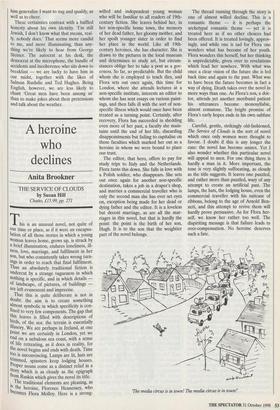A heroine who declines
Anita Brookner
THE SERVICE OF CLOUDS by Susan Hill Chatto, £15.99, pp. 271 by Susan Hill Chatto, £15.99, pp. 271 This is an unusual novel, not quite of our time or place, as if it were an encapsu- lation of all those stories in which a young woman leaves home, grows up, is struck by a brief illumination, endures loneliness, ill- ness, love, marriage, and fulfilment in her son, but who consistently takes wrong turn- ings in order to reach that final fulfilment. Thus an absolutely traditional fiction is undercut by a strange vagueness in which nothing is specific, and in which details of landscape, of pictures, of buildings are left evanescent and imprecise. That this is quite deliberate is not in doubt: the aim is to create something almost symbolic in which specificity is con- fined to very few components. The gap that this leaves is filled with descriptions of birds, of the sea: the terrain is essentially illusory. We are perhaps in Ireland, at one Point we are certainly in London, yet we end on a nebulous sea coast, with a sense of life retreating, as it does in reality, for the novel begins and ends with death. Time top is unconvincing. Lamps are lit, hats are trimmed, spinsters keep lodging houses. Proper nouns come as a distinct relief in a !to." which is as cloudy as the epigraph from Ruskin which gives the novel its title. The traditional elements are pleasing, as becomes the heroine, Florence Hennessey, who 'ecomes Flora Molloy. Here is a strong- willed and independent young woman who will be familiar to all readers of 19th- century fiction. She leaves behind her, in her non-specific home town, the memory of her dead father, her gloomy mother, and her spoilt younger sister in order to find her place in the world. Like all 19th- century heroines, she has character. She is drawn to the pictures in the local museum and determines to study art, but circum- stances oblige her to take a post as a gov- erness. So far, so predictable. But the child whom she is employed to teach dies, and Flora sets out once again, this time for London, where she attends lectures at a non-specific institute, interests an editor to whom she has sent essays on various paint- ings, and then falls ill with the sort of non- specific illness which would once have been treated as a turning point. Certainly, after recovery, Flora has succeeded in shedding even more of her past, a faculty she main- tains until the end of her life, discarding disappointments but failing to capitalise on those faculties which marked her out as a heroine in whom we were bound to place our trust.
The editor, that hero, offers to pay for study trips to Italy and the Netherlands. Flora turns this down. She falls in love with a Polish soldier, who disappears. She sets out once again for another non-specific destination, takes a job in a draper's shop, and marries a commercial traveller who is only the second man she has ever set eyes on, exception being made for her dead or dying father and the editor. It is a loveless but decent marriage, as are all the mar- riages in this novel, but that is hardly the point: the point is the birth of her son, Hugh. It is to the son that the weightier part of the novel belongs. The thread running through the story is one of almost willed decline. This is a romantic theme — it is perhaps the archetypal romantic theme — yet it is treated here as if no other choices had been offered. It is treated lovingly, approv- ingly, and while one is sad for Flora one wonders what has become of her youth. Flora wonders this herself, but her thinking is unpredictable, given over to revelations which lead her nowhere. With what was once a clear vision of the future she is led back time and again to the past. What was to have been the future becomes in fact a way of dying. Death takes over the novel in more ways than one. As Flora's son, a doc- tor, attends yet another moribund patient his utterances become monosyllabic, almost comatose. The bright promise of Flora's early hopes ends in his own subfusc life.
Careful, gentle, strikingly old-fashioned, The Service of Clouds is the sort of novel which once only women were thought to favour. I doubt if this is any longer the case: the novel has become unisex. Yet I also wonder whether this particular novel will appeal to men. For one thing there is hardly a man in it. More important, the tone is very slightly suffocating, as cloudy as the title suggests. It leaves one puzzled, and rather more than puzzled, wary of any attempt to create an artificial past. The lamps, the hats, the lodging house, even the commercial traveller with his suitcase of ribbons, belong to the age of Arnold Ben- nett, and this attempt to revive them will hardly prove persuasive. As for Flora her- self, we know her rather too well. The dispiriting message is that failure leads to over-compensation. No heroine deserves such a fate.
The media circus is in town! The media circus is in town!'


















































































 Previous page
Previous page